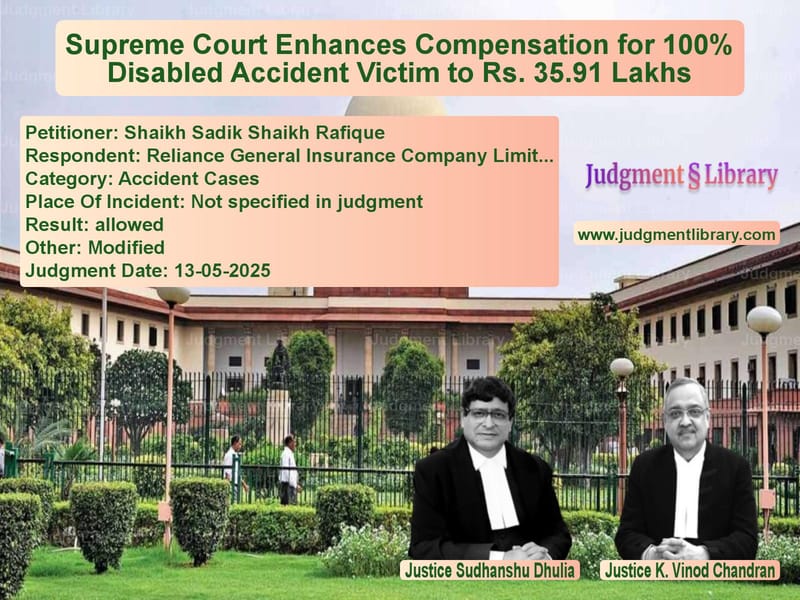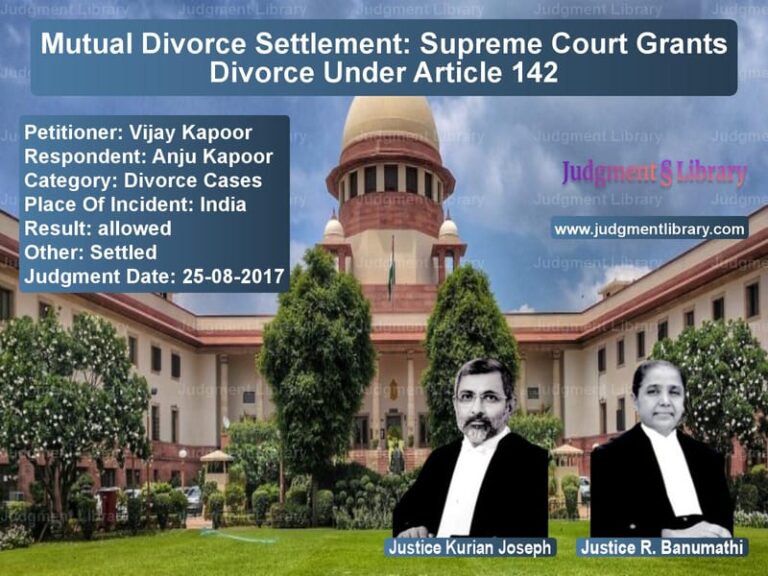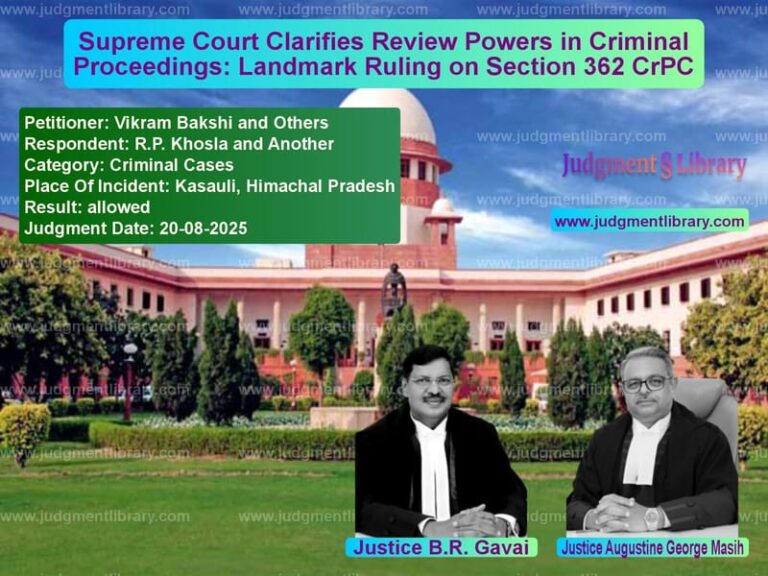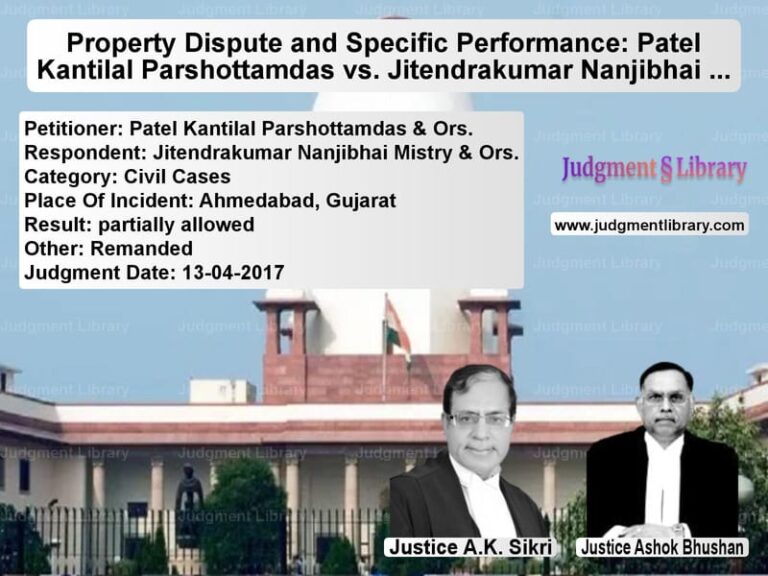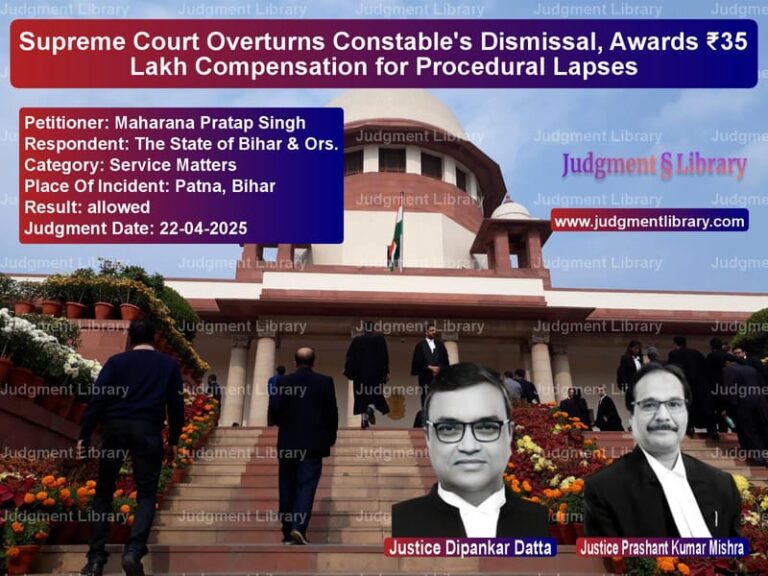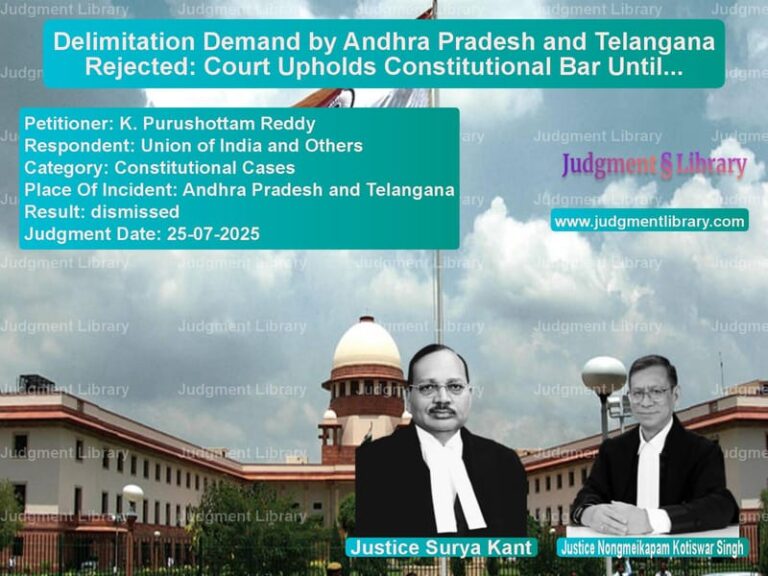Supreme Court Enhances Compensation for 100% Disabled Accident Victim to Rs. 35.91 Lakhs
In a compassionate and legally significant judgment, the Supreme Court of India has substantially enhanced the compensation awarded to a young man who became completely bed-ridden after a tragic truck accident. The case of Shaikh Sadik Shaikh Rafique, who was only 25 years old when the accident left him in a vegetative state, represents the judiciary’s commitment to ensuring ‘just compensation’ for victims of catastrophic injuries, particularly when they face a lifetime of dependency and medical care.
The legal journey began when Shaikh Sadik, then a young worker, was traveling in his employer’s truck that crashed with another vehicle. The accident left him with devastating injuries that transformed him from an earning individual to someone completely dependent on others for even basic daily functions. Before the Motor Accidents Claims Tribunal, the victim had claimed an annual income of Rs. 9,000, medical expenses of Rs. 4,00,000, and total compensation of Rs. 68,44,000. The Tribunal awarded Rs. 16,00,000, operating on the premise that the interest from this amount would provide for the claimant’s future needs.
The case then moved to the High Court, which increased the compensation to Rs. 25,83,600. However, still dissatisfied with what they believed was inadequate compensation for a lifetime of suffering and dependency, the claimant’s legal representatives approached the Supreme Court, seeking further enhancement. The Supreme Court bench comprising Justices Sudhanshu Dhulia and K. Vinod Chandran heard the appeal and delivered a judgment that not only provided substantial relief to the victim but also established important principles for calculating compensation in cases of permanent disability.
The Insurance Company’s Position
During the proceedings before the Supreme Court, the counsel for Reliance General Insurance Company Limited made what the court described as a “feeble attempt to point out that the policy did not cover the passengers in a goods vehicle.” This technical defense, commonly raised by insurance companies to avoid liability, was given short shrift by the court for two compelling reasons.
First, the Tribunal had already examined this issue and found that “the claimant was found to be an employee of the owner of the vehicle.” This finding was crucial because even if the insurance policy didn’t cover ordinary passengers, the employer-employee relationship created a different legal obligation. Second, and perhaps more significantly, the court noted that “there is no appeal filed from the order of the Tribunal by the Insurance Company and hence we refuse to consider the said contention raised in an appeal filed by the claimants for enhancement.” This procedural aspect meant that the insurance company had effectively accepted the Tribunal’s finding on this issue by not challenging it separately.
The Medical Evidence and Disability Assessment
The medical evidence in the case painted a grim picture of the victim’s condition. A doctor had been examined before the Tribunal and was also cross-examined, but the insurance company’s attempts to challenge his testimony proved unsuccessful. The court noted that the doctor “categorically deposed that the victim/claimant is 100% disabled and required lifetime support of an attendant to perform his daily chores.”
This medical testimony was crucial in establishing the extent of the victim’s disability. While the doctor had assessed the disability at 90%, the High Court had rightly determined the functional disability at 100%, recognizing that being in a vegetative state essentially means complete loss of earning capacity and near-total dependency on others for survival. The Supreme Court endorsed this assessment, understanding that when someone requires lifetime support for basic daily activities, their functional disability is effectively total, regardless of the precise medical percentage.
The Supreme Court’s Compensation Analysis
The Supreme Court undertook a detailed analysis of what constitutes ‘just compensation’ in cases of permanent disability, particularly for young victims who have their entire working life ahead of them. The court began by examining the income assessment, which is always a challenging aspect in compensation cases involving unorganized sector workers.
The High Court had increased the income from Rs. 4,500 (as accepted by the Tribunal) to Rs. 6,000 per month. However, the Supreme Court found this still inadequate. The court referenced the landmark case of “Ramachandrappa vs. Manager, Royal Sundaram Alliance Insurance Company Limited which determined an income of Rs.4,500/- per month in the year 2004 for a coolie.”
More importantly, the court relied on the Constitution Bench decision in “National Insurance Company Limited vs. Pranay Sethi and Others which found that there would be an incremental increase in the income which according to us would be reasonable if fixed at Rs.500/- per month for every successive year.” This principle of accounting for economic growth and inflation in income assessment represents a significant advancement in compensation jurisprudence.
Applying this principle to the present case, the court noted that “the accident occurred in the year 2015, 11 years after 2004 and going by the principles stated in the afore-cited decisions the appellant, an unskilled worker would be entitled to claim monthly income of Rs.10,000/-.” However, since the claimant had only asserted an income of Rs. 9,000, the court decided to “safely adopted” this figure rather than the higher amount it could have justified.
The court also corrected the multiplier applied by the High Court, noting that “The multiplier in the case of a 25 year old as held in Pranay Sethi would be 18 and not 17 as taken by the High Court.” This one-point difference in multiplier might seem minor, but in compensation calculations involving young victims, it can make a substantial difference in the final award.
The Final Compensation Calculation
The Supreme Court meticulously calculated the compensation under various heads to arrive at what it determined to be ‘just compensation’ for the victim’s catastrophic injuries. The court’s calculation method provides important guidance for future cases involving permanent disability.
For loss of future income, the court applied the formula: “9000 x 12 x 140% x 18 = Rs.27,21,600/-“. The 140% represents the addition of 40% for future prospects, as established in the Pranay Sethi case for victims below 40 years of age. This acknowledgment that a young worker’s income would likely have increased over their working lifetime is a crucial aspect of ensuring fair compensation.
The medical expenses were awarded based on the actual bills produced, amounting to “Rs.2,70,000/-“. While the claimant had initially claimed Rs. 4,00,000 for medical treatment, the court rightly restricted this to the documented expenses, following the established principle that compensation must be based on evidence rather than assertions.
For non-pecuniary damages, the court awarded “Rs.6,00,000/-“ as a consolidated amount for “pain and suffering, loss of amenities etc.” This substantial award recognizes the immense physical and psychological trauma suffered by the victim, who must endure a lifetime of dependency and loss of normal human experiences.
The total compensation awarded by the Supreme Court came to “Rs.35,91,600/-“, a significant enhancement from the High Court’s award of Rs. 25,83,600 and the Tribunal’s initial award of Rs. 16,00,000.
Legal Principles Established
This judgment reinforces several important legal principles in motor accident compensation cases. First, it emphasizes that technical defenses raised by insurance companies, particularly those not challenged in separate appeals, cannot derail the quest for just compensation for genuine victims.
Second, the judgment firmly establishes the principle of accounting for economic growth and inflation when determining the income of victims from the unorganized sector. The court’s acceptance of an incremental increase of Rs. 500 per month for every successive year provides a clear methodology for future cases.
Third, the judgment recognizes that functional disability may be 100% even when medical disability is assessed at a slightly lower percentage, particularly when the victim requires lifetime attendant care and has lost all earning capacity.
Fourth, the court correctly applied the multiplier of 18 for a 25-year-old victim, following the established principles in Pranay Sethi, and ensuring consistency in compensation calculations across cases.
Implementation and Directions
The Supreme Court not only enhanced the compensation but also provided clear directions for its implementation. The court ordered that “The above amounts, after deducting the amounts already paid, shall be disbursed with 8% interest per annum as determined by the Tribunal within a period of two months.”
Recognizing the practical difficulties faced by bed-ridden victims in accessing compensation, the court also directed that “The appellant or his authorised representatives would be entitled to give the account details of the appellant, to the insurance company to which account the remaining amounts with interest shall be paid online within the time stipulated hereinabove.” This direction for online transfer ensures that the compensation reaches the victim without unnecessary delays or procedural hurdles.
Broader Implications
This judgment has significant implications for accident victims across India, particularly those from economically disadvantaged backgrounds who work in the unorganized sector. By establishing a clear methodology for calculating income growth and applying appropriate multipliers, the judgment provides greater predictability and fairness in compensation awards.
The court’s approach also reflects a humane understanding of the devastating impact of catastrophic injuries on young victims and their families. The substantial enhancement in compensation acknowledges that monetary awards, while never truly compensating for the loss of a normal life, must at least ensure that victims receive proper care and maintain dignity in their altered circumstances.
For insurance companies, the judgment serves as a reminder that technical defenses cannot override the fundamental purpose of insurance – to provide relief to victims of accidents. The court’s dismissal of the insurance company’s ‘feeble attempt’ to avoid liability based on policy technicalities reinforces the consumer-friendly approach that Indian courts have increasingly adopted in insurance matters.
In conclusion, the Supreme Court’s judgment in Shaikh Sadik Shaikh Rafique’s case represents a significant step forward in ensuring that compensation in motor accident cases truly reflects the principles of justice, fairness, and compassion. By enhancing the compensation to Rs. 35,91,600 and establishing clear principles for future cases, the court has strengthened the legal framework for protecting the rights of accident victims, particularly those who suffer life-altering injuries.
Petitioner Name: Shaikh Sadik Shaikh Rafique.Respondent Name: Reliance General Insurance Company Limited & Ors..Judgment By: Justice Sudhanshu Dhulia, Justice K. Vinod Chandran.Place Of Incident: Not specified in judgment.Judgment Date: 13-05-2025.Result: allowed.
Don’t miss out on the full details! Download the complete judgment in PDF format below and gain valuable insights instantly!
Download Judgment: shaikh-sadik-shaikh-vs-reliance-general-ins-supreme-court-of-india-judgment-dated-13-05-2025.pdf
Directly Download Judgment: Directly download this Judgment
See all petitions in Road Accident Cases
See all petitions in Compensation Disputes
See all petitions in Motor Vehicle Act
See all petitions in Negligence Claims
See all petitions in Insurance Settlements
See all petitions in Judgment by Sudhanshu Dhulia
See all petitions in Judgment by K. Vinod Chandran
See all petitions in allowed
See all petitions in Modified
See all petitions in supreme court of India judgments May 2025
See all petitions in 2025 judgments
See all posts in Accident Cases Category
See all allowed petitions in Accident Cases Category
See all Dismissed petitions in Accident Cases Category
See all partially allowed petitions in Accident Cases Category

